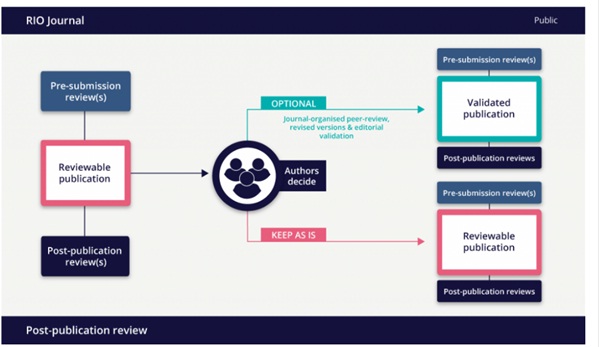Research Ideas and Outcomes (RIO) Journal: Making the Research Cycle Public

Behind each reach study, there are research proposals that are either rejected or accepted, conference papers, posters, PhD theses, project reports, new workflows, and endless drafts that are never seen by anyone outside the research team. Thus, as scientists, there is a lot more that has to be accomplished, in addition to having articles being published in international peer-reviewed journals. Previously, a lot of research-related information such as grant proposals, conference proceedings, raw data, project reports, supplementary information could not be easily published or made accessible to a wide audience. However, now many scientists are trying to encourage the development of new publishing models that encourage the publication information related to the complete research cycle. The Research Ideas and Outcomes Journal (RIO) publishes all types of information, including project proposals, data, methods, workflows, project reports and research articles on a single collaborative platform, with the most transparent, open and public peer-review processes.
Making the Research Cycle Transparent
RIO intends to make the whole scientific research cycle transparent, public, and open. RIO offers a whole platform for scientists to publish their entire research output, from their first research proposal and ideas, to their final results write up. By doing this, RIO aims to shed light on how science is actually done, the ideas that get rejected or remain incomplete, as well as share the long, mainly uncredited, process of scientific research. This initiative has two major benefits for the researcher. First—and perhaps most importantly from a career perspective—it allows researchers to get credit for their ideas and work from the very beginning. When a proposal can be published, whether successful or not, it can also be cited and added to his/her profile. Second, RIO allows researchers to connect all the research outputs from a single research project or group. This means that every conference paper, PhD thesis, new workflow or method, grant application can be published and the actual output produced in the lab can be seen by funding bodies, future employers, and possible collaborators.
Collaborative Writing and Review
This transparency also extends to their peer review process, which is entirely open and collaborative. Initial peer review occurs before submission and is a part of their open, collaborative writing tool: ARPHA. ARPHA stands for Authoring, Reviewing, Publishing, Hosting and Archiving and it aims to make scientific writing and publishing as painless and collaborative as possible. Within ARPHA, authors invite external reviewers to comment on the work to be published in an open, collaborative fashion. After submission and publication, the reviews themselves are published individually, with the reviewer’s name, and are citable. This innovation makes every step of the writing, revision and publication process visible and therefore holds reviewers accountable to their critiques, recommendations and language. In addition to mandatory pre-submission review, authors can also opt for further peer review, managed by the journal editors, which allows the publication to be revised further and to be marked as a valid publication.
Alternatively, authors can opt out of this and publish the work as a reviewable publication, allowing the community to review and comment on the work.

RIO’s innovative and open review process encourages collaboration, and this is an extension of its novel writing tool on which all RIO publications are written. RIO itself has no formatting requirements as they wish to place the focus on writing of ideas rather than format and structure. The ARPHA tool has automated buttons for inserting citations, figures and tables. Moreover, references can be imported from a number of reference managers, and ARPHA offers instant and automated “technical validation” that identifies inconsistencies for the writer. ARPHA exists entirely online and encourages collaborative writing and aims to remove the need for having multiple versions of a single document by helping authors work on one common platform.
Good for Scientists, Good for Science
The wider aim of RIO is to change science itself, making it more efficient, open and effective. RIO aims to make ideas that do not get funded or new methods that never get published available to other researchers to comment on, reuse or suggest improvements. RIO wants everyone in the academic community, from funding bodies to PhD students, to be able to communicate openly about their ideas and take them forward into new, successful projects. RIO’s initiative for a better scientific research landscape could help encourage the development of similar platforms in the future by other publishers or funding agencies.









